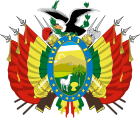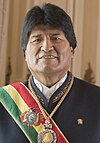
Carlos Diego de Mesa Gisbert is a Bolivian historian, journalist, and politician who served as the 63rd president of Bolivia from 2003 to 2005. As an independent politician, he previously served as the 37th vice president of Bolivia from 2002 to 2003 under Gonzalo Sánchez de Lozada and was the international spokesman for Bolivia's lawsuit against Chile in the International Court of Justice from 2014 to 2018. A member of the Revolutionary Left Front, he has served as leader of Civic Community, the largest opposition parliamentary group in Bolivia, since 2018.

Chuquisaca is a department of Bolivia located in the center south. It borders on the departments of Cochabamba, Tarija, Potosí, and Santa Cruz. The departmental capital is Sucre, which is also the constitutional capital of Bolivia.

Bolivia elects on national level a head of state – the president – and a legislature. The president and the vice-president are elected for a five-year term by the people. The National Congress has two chambers. The Chamber of Deputies has 130 members, elected for a five-year term using the Additional Member System, and in the case of seven indigenous seats by usos y costumbres. The Chamber of Senators has 36 members: each of the country's nine departments returns four senators allocated proportionally.

The Movement for Socialism–Political Instrument for the Sovereignty of the Peoples, alternately referred to as the Movement Towards Socialism or the Movement to Socialism, is a Bolivian socialist political party led by Evo Morales, founded in 1998. Its followers are known as Masistas.
The Confederation of Indigenous Peoples of Bolivia is a national representative organization of the Bolivian indigenous movement. It was founded in October 1982 in Santa Cruz de la Sierra as the Confederation of Indigenous Peoples of the Bolivian East, with the participation of representatives of four indigenous peoples of the Bolivian East: Guarani-Izoceños, Chiquitanos, Ayoreos and Guarayos.

The current Constitution of Bolivia came into effect on 7 February 2009 when it was promulgated by President Evo Morales, after being approved in a referendum with 90.24% participation. The referendum was held on 25 January 2009, with the constitution being approved by 61.43% of voters.

A constitutional referendum was held in Bolivia on 25 January 2009, postponed from the initially planned dates of 4 May 2008 and then 7 December 2008. Drafted by the Constituent Assembly in 2007, the new constitution was approved in the referendum according to an exit poll by Ipsos Apoyo for La Razón and ATB, a Bolivian television network. Furthermore, it required early elections to be held on 6 December 2009.

The Media Luna or Media Luna Ampliada refers to a group of four departments – Santa Cruz, Beni, Pando, and Tarija – in Bolivia which are home to a greater proportion of opponents to the national government led by Evo Morales and the Movement for Socialism (MAS) than the rest of the country. Pando has seen increasing support for MAS since 2009, while Tarija was initially supportive but has opposed MAS in every election after 2014. In contrast to the predominantly Indigenous Andean populations of the Andean region such as La Paz and Cochabamba, the departments in the Media Luna are majority mestizo, as well as being made up of the remaining 26 groups of lowland indigenes with white minorities, specifically in Santa Cruz de la Sierra.

General elections were held in Bolivia on December 6, 2009, following a constitutional referendum held on 25 January 2009. Voters elected:
Savina Cuéllar Leaños is a Bolivian politician who formerly as governor of the Department of Chuquisaca. She is of Quechua ancestry and one of the leading oppositionists to president Evo Morales. 2006 she joined the Bolivian Constituent Assembly of 2006-2007 as an Evo Morales-supporter but changed sides over the question of whether Sucre or La Paz should be the capital of the country.

Bolivia has had seventeen constitutions, including the present one, since its foundation in 1825.

The 2010 Bolivian regional elections were held on 4 April 2010. Departmental and municipal authorities were elected by an electorate of approximately 5 million people. Among the officials elected are:

The Presidency of Evo Morales began on January 22, 2006 when Evo Morales was inaugurated as the 80th President of Bolivia, following his victory in the 2005 general election, where he won 53.7% of the vote, defeating Jorge Quiroga, Samuel Doria Medina, and several other candidates. Morales increased taxation on the hydrocarbon industry to bolster social spending, emphasising projects to combat illiteracy, poverty, racism, and sexism. Vocally criticizing neoliberalism and reducing Bolivia's dependence on the World Bank and International Monetary Fund, his administration oversaw strong economic growth while following a policy termed "Evonomics" which sought to move from a liberal economic approach to a mixed economy. Scaling back U.S. influence in the country, he built relationships with leftist governments in the Latin American pink tide and signed Bolivia into the Bolivarian Alliance for the Americas. Attempting to moderate the left-indigenous activist community, his administration also opposed the right-wing autonomist demands of Bolivia's eastern provinces. Winning a recall referendum in 2008, he instituted a new constitution that established Bolivia as a plurinational state and was re-elected in 2009. His second term witnessed the continuation of leftist policies and Bolivia's joining of the Bank of the South and Community of Latin American and Caribbean States; he was again reelected in the 2014 general election. Following the disputed 2019 general election and the ensuing unrest, Morales resigned and flew to Mexico where he had been granted political asylum.

The most recent Constituent assembly of Bolivia was the Constituent Assembly of 2006–07, which drafted a new Constitution which was approved in the Constitutional referendum of 2009.
Raúl Prada Alcoreza is a Bolivian philosopher and sociologist, a docent-researcher at the Universidad Mayor de San Andrés, member of the La Paz-based Comuna group of political theorists, and participant in national Bolivia politics. He served as a member of the Bolivian Constituent Assembly of 2006-2007 and as Vice Minister of Strategic Planning in the Ministry of Economy and Finance from February to September 2010. As a public intellectual, he has commented on contemporary Bolivian politics and worked with social movement organizations including CONAMAQ.

Jeanine Áñez Chávez is a Bolivian lawyer, politician, and television presenter who served as the 66th president of Bolivia from 2019 to 2020. A former member of the Social Democratic Movement, she previously served two terms as senator for Beni from 2015 to 2019 on behalf of the Democratic Unity coalition and from 2010 to 2014 on behalf of the National Convergence alliance. During this time, she served as second vice president of the Senate from 2015 to 2016 and in 2019 and, briefly, was president of the Senate, also in 2019. Before that, she served as a uninominal member of the Constituent Assembly from Beni, representing circumscription 61 from 2006 to 2007 on behalf of the Social Democratic Power alliance.

Oscar Miguel Ortiz Antelo is a Bolivian businessman and politician who served as minister of economy and public finance from July to September 2020 and as minister of productive development from May to July 2020. As a member of the Social Democratic Movement, he previously served two terms as a senator for Santa Cruz from 2015 to 2020 on behalf of the Democratic Unity coalition and from 2006 to 2010 on behalf of the Social Democratic Power alliance. Nearing the end of his second term, Ortiz was his party's presidential candidate, attaining fourth place in the annulled 2019 general elections. During his first term, he served as president of the Senate from 2008 to 2010, the last opposition legislator to preside over the upper chamber as of 2023. Outside of national politics, Ortiz served as president of the Union of Latin American Parties from 2018 to 2021 and has been the rector of the Bolivian Catholic University at Santa Cruz since 2021.

Miriam Marcela Revollo Quiroga is a Bolivian academic, politician, and sociologist who served as a member of the Chamber of Deputies from La Paz, representing circumscription 10 from 2010 to 2015. Though Revollo's political career is closely linked to that of her husband, longtime La Paz Mayor Juan del Granado, her political origins are independent of marriage. A graduate of the higher universities of San Simón and San Andrés, Revollo entered political life as an activist in the student movement and was a steadfast advocate for the inclusion of women in the country's democratic process. Together with her husband, she founded the Fearless Movement, with which she was elected as a party-list member of the Constituent Assembly from La Paz from 2006 to 2007. As a parliamentarian, she continued to work toward the advancement of women's causes, largely supporting the social policies enacted by the ruling Movement for Socialism, even as she simultaneously criticized many of the administration's illiberal practices.

Franz Gróver Choque Ulloa is a Bolivian industrial engineer, lawyer, and politician who served as vice minister of employment, civil service, and cooperatives from 2019 to 2020. A member of the Social Democratic Movement, he previously served as a party-list member of the Chamber of Deputies from Oruro from 2010 to 2014 on behalf of the National Convergence alliance and as a member of the Constituent Assembly from Oruro, representing circumscription 32 from 2006 to 2007 on behalf of the Social Democratic Power alliance.

Carlos Aparicio Vedia is a Bolivian diplomat, lawyer, and politician serving as ambassador of Bolivia to Peru since 2021. Aparicio studied law at the University of San Francisco Xavier, during which time he became an adherent of Trotskyist political theory, leading him to join the emerging Movement for Socialism. He served as president of the party's departmental youth wing and participated in its successful 2005 general election campaign. In 2006, he obtained his first elective position, serving as a member of the Constituent Assembly from Chuquisaca, representing circumscription 5 from 2006 to 2007. Two years later, he was elected to represent the same constituency in the Chamber of Deputies, where he served from 2010 to 2015. Following the conclusion of his term, he served as vice minister of public security from 2015 to 2017 and ambassador to Italy from 2018 to 2019.













